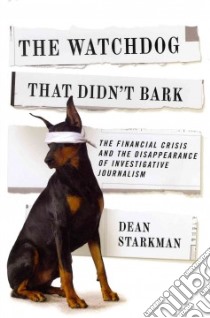The Watchdog That Didn't Bark - 9780231158183
Un libro in lingua di Dean Starkman edito da Columbia Univ Pr, 2014
- € 22.30
- Il prezzo è variabile in funzione del cambio della valuta d’origine
Nothing defined the financial crisis of 2008 as much as the degree to which it took the public -- and the press -- by surprise. In a world of twenty-four-hour news coverage and financial reporting, how could so many mainstream journalists, covering something so closely, miss something so big while a few, mostly outside the mainstream, got it? More broadly, what did the business press's failure say about contemporary journalism's ability to explain looming systemic problems to the public?
In this sweeping, incisive study, Dean Starkman answers those questions, exposing the critical shortcomings that softened coverage during the mortgage era and the years leading up to the collapse. The Watchdog That Didn't Bark travels back to the early twentieth century to find the roots of the problem in business news's origin as a market messaging service geared toward investors. This access-dependent strain of journalism was opposed by the grand, sweeping work of the muckrakers. Propelled by the innovations of Bernard Kilgore, the great postwar editor of the Wall Street Journal, these two genres merged when mainstream American news organizations institutionalized muckraking in the 1960s, creating a powerful guardian of the public interest. But as the mortgage era dawned, deep cultural and structural shifts -- some unavoidable, some self-inflicted -- eroded journalism's appetite for its role as watchdog. The result was a deafening silence about systemic financial industry corruption that, tragically, grew more profound even as the mortgage madness reached its terrible apogee from 2004 through 2006.
Starkman frames his analysis in a broad argument about journalism itself. He divides journalism into two competing approaches -- access reporting and accountability reporting. These starkly opposed ideas about what journalism is rely on entirely different sources and produce radically different representations of reality. As Starkman explains, access journalism came to dominate business reporting in the 1990s, a process he calls "CNBCization," and rather than examine risky, even corrupt, corporate behavior, mainstream reporters focused on profiling executives and informing investors.
Starkman concludes with a critique of digital-news ideology and corporate influence, which threaten to further undermine investigative reporting, and he shows how financial coverage, and journalism as a whole, can reclaim its bite.
Informazioni bibliografiche
- Titolo del Libro in lingua: The Watchdog That Didn't Bark
- Sottotitolo: The Financial Crisis and the Disappearance of Investigative Journalism
- Lingua: English
- Autore: Dean Starkman
- Editore: Columbia Univ Pr
- Collana: Columbia Univ Pr (Hardcover)
- Data di Pubblicazione: 07 Gennaio '14
- Genere: LANGUAGE ARTS and DISCIPLINES
- Argomenti : Financial crises United States Press coverage Investigative reporting United States
- ISBN-10: 0231158181
- EAN-13: 9780231158183


